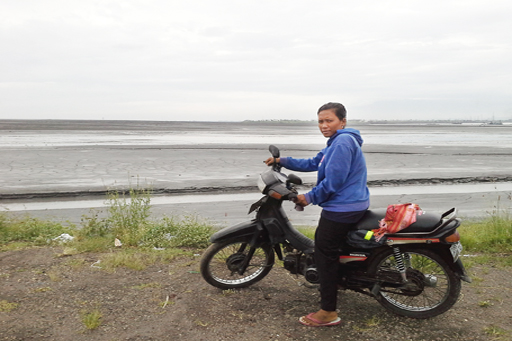As the mudflow expands to more villages and lands in Sidoarjo, East Java, residents in the Porong subdistrict are doing whatever it takes to survive another day.
Most residents who were once farmers and factory workers are now working as motorcycle taxi drivers (ojek). While most of them are men, at least one woman has been forced to take the job in one of the world’s most dangerous disaster settings.

Harwati had donned a dusty blue sweater and black trousers when The Jakarta Post interviewed her. She kept her hair tied up. She looked straight into the interviewers’ eyes as she spoke and she held nothing back of her struggles and neglected residents in Porong.
“I have been an ojek driver for around the last six years,” Harwati said, meaning that she took the job shortly after the mud first erupted in May 2006.
“Before the mudflow erupted, I was a housewife and I had a convenience store. Life was very good. It was not lavish but good enough for us to get by,” she added.
Then on May 2006, everything changed for Harwati, her family and the residents of Porong in general. On May 29 of that year, PT Lapindo Brantas conducted drilling nearby the area and the first mudflow eruption began to take place.
The company and the government tried various methods to stop the flow, with the help of various scientists from inside and outside the country. Yet the mudflow is still going strong after nearly seven years and has buried more than 600 hectares of land, displacing almost 40,000 people. It has submerged three subdistricts, 12 villages, over 11,000 buildings and 362 hectares of rice fields.
“When the mudflow struck, I was forced to evacuate to a shelter. Along with my husband, parents and children, I stayed at the camp for nine months,” Harwati said.
Staying in the camp exposed Harwati and her family to the air and water that had been polluted by the mudflow. Within months, Harwati’s husband, Muhtadi, developed cancer and died in 2007, she said.
“My husband’s death forced me to become an ojek. I first tried to look for work at factories but nobody wanted to hire a 37-year-old woman. I couldn’t compete with younger people for factory jobs,” Harwati said.
On her first day as an ojek driver, she admitted she could not even drive a motorcycle properly.
“I knew the theory and concept of riding a motorcycle, but I had never done it. Fortunately, my fellow drivers have all been very supportive even though I’m a woman. They taught me how to ride a motorcycle and they were always willing to help me if I had a minor accident,” she said.
Harwati now earns around Rp 500,000 (US$51.56) per month, a lot less than what she used to earn as a convenience store owner but enough to finance her parents and the schooling of her two daughters — Dian Kahrina Maharani and Khatrina Maharani.
“I’m still waiting for the remains of my compensation payment. Once I receive it, I’ll be moving to a better place,” she said.
Under Presidential Regulation no.14/2007, Lapindo should compensate residents in the area by buying their properties in two separate payments. First, Lapindo should pay residents 20 percent of the property values and the rest of the payment should be completed within two years.
In 2009, however, the Supreme Court ruled that the mudflow was a natural disaster and Lapindo, partially owned by the Bakrie family, had no obligation to pay compensation. Despite this, Aburizal Bakrie, the patron of the Bakrie family and the chairman of the Golkar Party, promised to fully pay residents by buying their land, saying it was his late mother’s last wish.
But the Bakrie group and family representatives have said they are still trying to fulfill their commitment, forcing people yet to receive full compensation to stay in the area, even though it has practically become a ghost town with only a few businesses and jobs available.
Harwati said that her experience had made her question whether the state still considered the Porong residents as Indonesian citizens.
“Some of us have been compensated using the state budget while some have not received full compensation, because their properties are located in the affected zone,” she said, meaning that they are only entitled to be paid by Lapindo or the Bakrie group.
“I often wonder, are we, the residents of Porong, divided into two citizenship groups? Those who belong to Indonesia and those who belong to Lapindo?” she asked.
